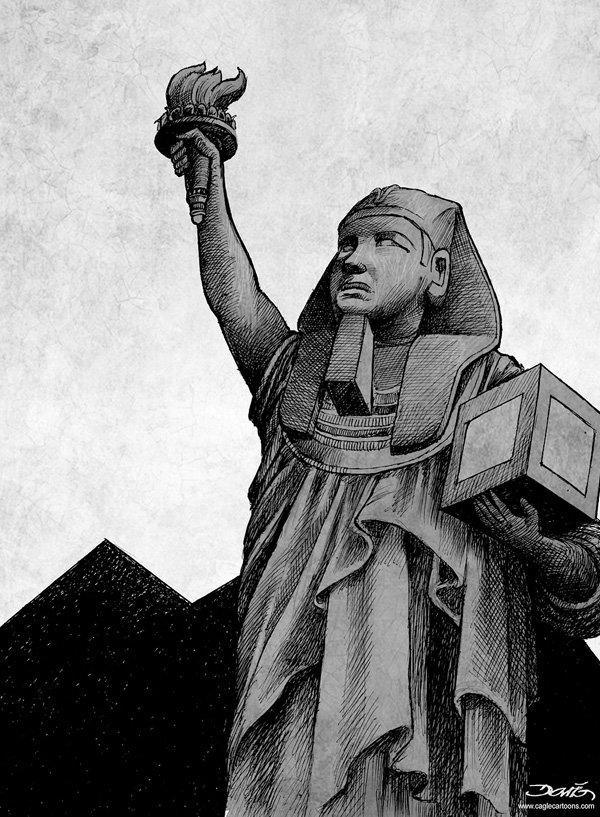Former Arkansas Gov. Mike Huckabee was atop a recent poll of prospective 2012 Republican presidential candidates.
With a year before the first votes are cast for Republican hopefuls, polls at this point are not especially meaningful, and some pundits don’t take Huckabee seriously or doubt that he will actually become a candidate.
However, Huckabee has fooled the experts before, and his affability as a campaigner shouldn’t be underrated. If, indeed, Huckabee does emerge as a GOP front runner, his record and position on current and past issues will come under closer scrutiny, as will that of other Republican hopefuls.
In that respect it has been interesting to watch leading Republicans respond to the events in Egypt and to the Obama administration’s handling of this major foreign policy challenge.
Some were highly critical of the administration’s role.
There’s no doubt that the Obama team was taken by surprise with the rapidity of developments in Egypt. It faced a fundamental foreign policy dilemma: Stick with an autocratic “ally” or follow a more uncertain course and embrace efforts to establish democracy. It was the classic choice of realism vs.
idealism.
The U.S. has a checkered record in dealing with dictators. During the Cold War, the U.S. stood behind a number of tyrants simply because they were anti-Communists. All too often, we have remained tied to autocratic leaders all too long. In the case of Egypt’s Mubarak, he has controlled a country that is a key to maintaining stability in a volatile region. And a “realist” approach has meant that five successive administrations have helped him remain in power. But what about American idealism and democratic principles? President Obama eventually made clear that the U.S. was siding with the democratic uprising and the Mubarak-must-go protests.
Republican House Speaker John Boehner said the Obama administration managed a difficult situation about as well as possible.
Senate Republican Leader Mitch McConnell refrained from criticism and said, “Ithink we ought to speak as one voice during this crisis.” These Republican leaders were perhaps reflecting the old adage that politics stops at the water’s edge. However, that notion has often been abandoned in recent times and there is room for honest disagreement as long as it is motivated by legitimate policy concerns rather than political gamesmanship.
If Boehner and McConnell were restrained, other prominent Republicans, including Huckabee, were not. Dick Cheney, ever the realist, called Mubarak “a good man, a good friend and ally” who brought stability to the region and shouldn’t be pressured to leave office. Rick Santorum criticized Obama for siding with the protesters andagainst an American ally.
Tim Pawlenty said the administration’s response was “nearly incoherent” and New Gingrich said it was “amateurish.”
What about Huckabee?
He made initial comments while on one of his frequent visits to Israel. He views the developments in Egypt and the region in terms of how they affect Israel. With the Mubarak government having honored the treaty with Israel for 30 years, Huckabee questioned whether change in Egypt would be good for Israel. He said the U.S.
was abandoning an ally in Mubarak who “had not done everything wrong, and had brought stability, and had kept a strong even keel to the peaceful nature of the border between Israel and Egypt.”
So Huckabee came down on the side of the realists and said the situation was “very tenuous” not just for the Middle East, but could set off a cascade of destabilization.
There are no guarantees about what will happen in Egypt and what the broader ramifications might be. It is also true that some ofthose involved in the media coverage in Cairo got swept up in the euphoria of the events and may have been overly optimistic about what happens next. Egyptian democracy may turn out to be an illusory dream.
But it is hard to argue that the United States should not have supported the movement for democracy in Egypt. The realists may prove correct in apprehension about instability and uncertainty, and it will be revealing in the coming months to look back on the positions our political leaders and aspirants have taken at this pivotal point and what that will tell us about their capability to set foreign policy.
In this case and in many others, it is likely that the best course of action for the United States is a blend of idealism and realism.
In affirming our support for freedom and selfdetermination we are also affirming that they offer the best prospect for stability in the long-term.
HOYT PURVIS IS A JOURNALISM AND INTERNATIONAL RELATIONS PROFESSOR.
Opinion, Pages 13 on 02/20/2011

